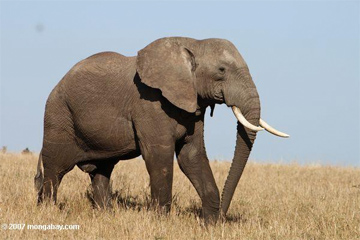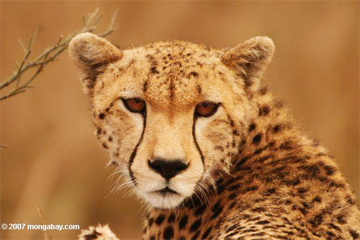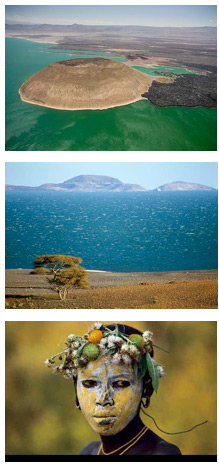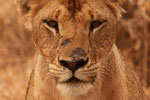Famed paleoanthropologist Richard Leakey envisions the future with a view that remembers the past
 Looking Back: A family world famous for discovery. Richard Leakey and his parents, Louis and Mary Leakey. Time Magazine cover, featuring Dr Richard Leakey, courtesy of Time Warner. Leakey family photos courtesy of Academy of Achievement.org. |
Following in his family’s footsteps, Dr. Richard Leakey, is considered the heir to the scientific legacy of his parents, Louis and Mary Leakey, icons in the field of paleoanthropology. Dr Richard Leakey has been credited with some of the field’s most successful paleoanthropologic finds, including a near complete, groundbreaking, Homo Erectus fossil dubbed “Turkana Boy”. The scientific contributions of the Leakey family have reshaped our views of the origins of mankind and shed new light on the history and shared ties of the human family.
Dr Richard Leakey has been the Director of Kenya’s National Museums and the Kenya Wildlife Service, and in these roles, he has emerged as a champion of global conservationist.
AN INTERVIEW WITH DR. RICHARD LEAKEY
Mongabay: Dr Leakey, you have enjoyed a long, successful, and diverse career. Please tell our readers what first drew you into the family business of paleoanthropology.
Dr. Richard Leakey: I was raised in a family that devoted its entire waking time to the study of evolution through the recovery of archeological traces in the fossil record, and I suppose my interest in this field was instilled at a very early age.
I was not a particularly good scholar at school. I detested formal education and could be described as a high school dropout. There was some initial concern for my future. However, I held a strong belief that if one was determined then one could succeed. I had very little idea of what to do, though, during the first five or six years of my adult life. I was drawn back to the field of paleoanthropology because it was something that was familiar, even though I had no initial formal training in this area.
Mongabay: Is it fair to say you found your future career by looking to your own past?
Dr. Richard Leakey: I guess it is.
Mongabay: Why do you feel it is important for humanity to learn about our very earliest roots? What do we learn by looking back?
Dr. Richard Leakey: One of the interesting things about humanity is that we are very good observers. We see things, and we are inclined to ask questions. We have this cognitive capacity which seems to be an intrinsic part of the human condition, we have asked questions both large and small: “Why does the sun rise over there?” “Why does it set over here?” “Why is it hot?” “Why is the sky blue?” (etc). Inevitably, this line of questioning leads to our pondering the meaning of existence and our place in it. We have sought answers and meaning through the concepts of religion, spiritualism, mysticism, etc, and still the questioning continues. Humans, unlike other intelligent species, worry about unanswered questions. The study of the biological origin of humanity seems to satisfy a deeper human need to understand.
 Elephant in Kenya. Photo by Rhett A. Butler. |
Perhaps, even more relevant, when we look back at the fossil record, we learn much about the mechanics of life: the process of evolution, the role of extinction (leading to), and the development of new species. And it’s not just a question of whether an elephant goes extinct, or a rhino, or a giraffe; it’s the understanding that the pressures of change and adapting, or the failure to adapt, are at the roots of this process.
What most people don’t realize is that the process of evolution continues to this very day. A good example of real evolution at work involves some of the viruses and bacteria that plague humanity. To evolve, you need stress and pressures, and humans have supplied it to these pathogens in the form medications, pesticides, antibiotics, etc. But where a human or an elephant may take a hundred thousand years to effect a major genetic adaptation, a microbe’s generation time is very short. Through the process of genetic variation, a virus can create a new species by adapting to a set of pressures in as little as a month. With new species or strains of bacteria and viruses causing HIV aids, resistant TB, etc, microbial evolution creates new challenges for humanity, as the process of life continues.
Humanity now has the ability to effect great environmental change, and the fossil record shows us that this change can have consequences. Our long-term survival is not a given and we need to take stock and accountability for our own actions. Managing the mechanics of change is fundamental to all species, and we are the only ones with the ability to reason through this process.
Mongabay: It could be said that conservation is a very forward thinking human intellectual pursuit. What caused you to change gears in your career and focus on conservation?
 Portrait of cheetah in Kenya. Photo by Rhett A. Butler. |
Dr. Richard Leakey: Well, I am not sure that the field of conservation is forward thinking; for many conservationists it becomes “a job,” and these people are trying to make a living out of what they do. But conservation at its best works to maintain a healthy planet, with the understanding that we need a healthy environment, or we are going to go under in terms of the way we live.
I went into conservation because it was a challenge. I saw many of Kenya’s wildlife species on the edge of severe threat, if not outright extinction. And I saw mismanagement, corruption, incompetence, etc, by the local authorities as the primary driving force of this problem. I had been working at the National Museums of Kenya for twenty-one years, and I was looking for something else to do that would intrigue me. As I had been involved in the field of Natural History, stepping up to the challenges of conservation seemed a natural fit.
Mongabay: You have taken some controversial positions in the field of conservation – a shoot-to-kill policy for Kenya’s poachers, support of a proposed Serengeti Highway, etc.
Do you still stand by these positions? For example, has this anti-poaching policy been effective?
Dr. Richard Leakey: The shoot-to-kill policy was not a shoot-to-kill policy at all, but rather a policy line drawn against an operation of professional poachers. If well armed, professional poachers were going to run through our parks and shoot at our rangers as well as our wildlife, then the policy was that they should expect some reprisals or return fire. When this anti poaching stand was first taken, there were initially some very heated firefights, with casualties on both sides. But the fighting stopped very quickly and soon we had no rangers killed, no poachers killed, and after a few months, no elephants killed either. To save our national parks it became a matter of discipline; a line was drawn in the sand and nobody crossed it.
 Looking to Save Shared Global Heritage: The Turkana Basin Institute, founded by Dr Richard Leakey. Photos of Lake Turakana and of an Omo Tribes woman courtesy of photographer Hans Sylvester. |
Today the loss of elephants, the loss of rhinos, the loss of multiple species of animals to the bush meat trade, has shifted the situation back to the untenable. I believe that this is due to a lack of proper management by the wildlife authorities. The forces that are employed to protect our wild resources are most often the ones trading in them. And it is very hard to fight a poacher wearing the uniform of those who have been brought in to protect these resources.
I think this needs to be said, and it needs to be brought up to government authorities in Kenya and in many other countries. We need renewed leadership in this area. We seem to be increasingly in a world where people are afraid to step up and take a stand and where our officials hide behind the inactions and lack of accountability offered by government run committees. If we are to learn from the past, we should know that we don’t have time for that.
Mongabay: Do you feel that the proposed Serengeti Highway is worth all the potential natural resource cost?
Dr. Richard Leakey: Well, I think the Serengeti is a fantastic ecosystem and should be preserved at all costs, but we need to address the problem realistically. The Serengeti is also surrounded by large growing communities of people. You are not going stop people from crossing this area in the long-term; the towns this road is intended to serve are projected to grow into a three million plus metropolis. Why pit nature and millions of local people directly against each other? History has shown that this strategy has not worked well for either side in this type of conflict. Conservationists will claim victory for temporarily stopping this road, but this is no victory at all, merely a “collective duping” as it is only forestalling the inevitable. Local human pressures demand eventually demand a six-lane highway going in each direction. Start now and work to build a magnificent, architecturally spectacular highway that could also stand as a monument or symbol of human development in partnership with nature. This project would serve the needs of the local people, and the Great Migration can continue into perpetuity.
Mongabay: Preserving Kenya’s Lake Turkana area and the region’s indigenous Omo people has been a key priority for you. Describe why you feel it is important to protect Lake Turkana and the Omo River region:
Dr. Richard Leakey: Lake Turkana and the Omo River region is a unique ecosystem in the Northern part of Kenya, near the Ethiopian border, and is probably the nexus point of human migration out of Africa. All of humanity can trace collective heritage to this area. The Lake today supports 500,000 people in terms of water for livestock, agriculture, and fisheries on both sides of the border. Lake Turkana is four million years old, it is an archeological site of unparalleled importance, and could be a major tourist destination as it has been part of the human story for much of our species history. To let it disappear now because one faction, in one country, wants to dam the rivers that support the lake to sell environmentally costly hydroelectric power to other countries in the region, and to create a sugar cane industry, where it is ill afforded, seems utterly short-sighted, wasteful, and selfish on the part of these local leaders. People are reluctant to talk out against this type of waste in both Ethiopia and Kenya for fear of government reprisals. But this is wrong and we need to take a stand. The Lake Turkana basin is central to the human experience. Are we a people who squander our collective heritage and that of future generations just for quick, short-term, unsustainable profits?
Mongabay: Please describe your WildlifeDirect Project. What are its goals?
 WildlifeDirect was established in 2006 to provide direct support for global field conservation, via the use of interactive conservation blogs, which enables global wildlife enthusiasts to play a direct role in the survival of some of the world’s most endangered species. Donors can interact with frontline conservationists to track the impact of their support in near real-time. WildlifeDirect was the 2009 recipient of Mongabay’s “Innovation in Conservation” award. |
Dr. Richard Leakey: WildlifeDirect is definitely a forward thinking project and its intent is to use the Internet to give people from all over the world the opportunity to participate directly to help endangered species conservation. It’s extremely difficult to raise say $500,000 for any single project, and I thought it would be much easier for large numbers of people to give a dollar to conservation simply by pressing a button on a screen. If you had enough membership, you could raise enormous amounts of money through this channel.
Unfortunately, this project never really took off and it is slow to fly, like I said, this is a very forward thinking project. It is still very much alive and, as with most forward thinking projects, you have to stay committed to the vision and goals. I believe this project will eventually find the right footing. As with all forward thinking new endeavors, you have to have a little faith.
 Looking Forward: Multiple endangered species, being conserved through the efforts of global conservationists and connected to the global community through WildlifeDirect. Pictured: The critically endangered Mountain Gorilla of Rwanda, the Bornean Sun Bear of South-East Asia, the Blue Fronted Amazon of South America. Photos courtesy of WildlifeDirect. |
Mongabay: With modernization increasing in Africa, a race among the world’s developed powers for “their fare share” of the continent’s natural resources seems to be occurring. Too often this competition is at odds with conservation. Do you think the goals of development and conservation could be aligned? What could be done in Africa to establish the right balance between development and conservation?
Dr. Richard Leakey: I don’t think that there is the slightest question in my mind that development and nature need to be considered dichotomies. They are not; as a matter of fact, it really is just the opposite. You can develop countries as big as Kenya and still have a healthy environment if you and support policies that consider an appropriate long-term view.
Unfortunately, most commercial interests and most politicians are only worried about short-term goals. “What will my profits be in the next five years?” “Will I win the next election?” We need to be thinking where Africa will be 50 years from now. And we need to be thinking where of the world will be 100 years from now. Why can’t this generation think beyond five years? We know by examining the past that our actions today can have a very long-term effect. Supporting policies that have an appropriate long-term view are critical for humanity at this juncture in time.
Mongabay: What hopes do you have for humanity as we collectively move forward? Why do we need nature?
Dr. Richard Leakey: We need nature because we are part of it. The processes that shape life, shape our future as well. When we pit ourselves against nature or squander our natural resources, we are really doing ourselves an enormous disservice. We are a very intelligent species; does this type of action make sense? My hope is that more people will come to realize the value of nature, and our place within it, as we collectively move forward.
Related articles
A message to poachers: Kenya burns elephant ivory stockpile
(07/21/2011) Yesterday the president of Kenya, Mwai Kibaki, sent a fiery signal to illegal wildlife traffickers worldwide. Kibaki lit up five tons of elephant ivory, worth $16 million on the black market, to show the continent’s resolve to undercut illegal poaching. This was the second time Kenya has set fire to millions of dollars worth of ivory.
Richard Leakey: ‘selfish’ critics choose wrong fight in Serengeti road

(07/02/2011) The controversial Serengeti road is going ahead, but with conditions. According to the Tanzanian Minister for Natural Resources and Tourism, Ezekiel Maige, the road will not be paved and it will be run by the Tanzanian park authority who will have the power to monitor traffic to ‘ensure no harm comes to the wildlife population’. Critics argue that even an unpaved road would eventually cripple the largest land migration in the world. However, famed Kenyan conservationist, ex-politician, and anthropologist, Richard Leakey, told mongabay.com that critics of the road are focusing on the wrong fight while failing to respect Tanzania’s right to develop. Leakey says that instead of attempting to stop the road from being built, which he believes is inevitable, critics should instead focus on funding a truly wildlife-friendly road.
Blogging wildlife rangers drive microconservation

(12/01/2009) Wildlife Direct, a group that promotes conservation through blogging by rangers and scientists, has won mongabay.com’s “Innovation in Conservation Award” for 2009. The prize, which includes a cash donation and and prominent placement on the mongabay.com web site and newsletter for the month of December, is granted each year to an organization using an unconventional and highly effective approach to conserving forests and biodiversity.